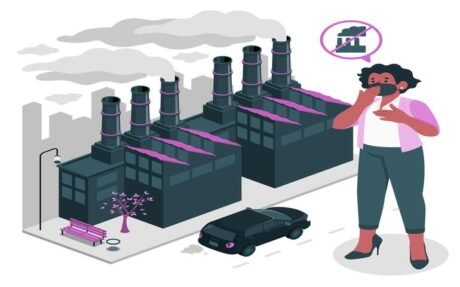Course Features
Price
Study Method
Online | Self-paced
Course Format
Reading Material - PDF, article
Duration
6 hours, 5 minutes
Qualification
No formal qualification
Certificate
At completion
Additional info
Coming soon
- Share
Overview
Environmental health plays a crucial role in protecting public safety, community well-being, and sustainability. The Environmental Health Level 5 Advanced Diploma is designed to provide students with specialist knowledge in environmental policies, health risk management, and sustainability strategies to help reduce pollution, enhance sanitation, and improve food and occupational safety.
The course begins with an introduction to environmental health, exploring its historical development, regulatory frameworks, and the role of environmental health practitioners. Students will gain an understanding of legislation and policy frameworks in the UK, including environmental impact assessments (EIA), key legal standards, and compliance requirements.
A significant focus is placed on air and water quality management, where students learn about the sources and effects of air pollution, monitoring strategies, and solutions for improving air quality. The water management module explores water treatment technologies, contaminants, and health impacts, ensuring learners understand the importance of clean and safe water.
Waste management is another critical area, covering waste classification, recycling strategies, and best practices for sustainable waste disposal. Students will also study food safety and hygiene, gaining insights into foodborne illnesses, risk assessments, and food safety regulations to ensure safe food handling and processing in various sectors.
The course further delves into occupational health and workplace safety, equipping learners with the knowledge to assess workplace hazards, implement risk management strategies, and comply with health and safety legislation. Additionally, students will explore the impact of environmental health on community well-being, including case studies on public health interventions and community engagement initiatives.
The final section focuses on emerging environmental health issues, such as climate change, environmental justice, and technological advancements in sustainability. The course concludes with a research and professional practice module, teaching students how to conduct environmental health research, follow ethical considerations, and pursue continuous professional development in the field.
By the end of the diploma, graduates will be well-equipped to identify, analyze, and mitigate environmental health risks, making them valuable assets in government agencies, environmental consultancies, regulatory bodies, and sustainability-focused organizations.
Who is this course for?
Environmental health plays a crucial role in protecting public safety, community well-being, and sustainability. The Environmental Health Level 5 Advanced Diploma is designed to provide students with specialist knowledge in environmental policies, health risk management, and sustainability strategies to help reduce pollution, enhance sanitation, and improve food and occupational safety.
The course begins with an introduction to environmental health, exploring its historical development, regulatory frameworks, and the role of environmental health practitioners. Students will gain an understanding of legislation and policy frameworks in the UK, including environmental impact assessments (EIA), key legal standards, and compliance requirements.
A significant focus is placed on air and water quality management, where students learn about the sources and effects of air pollution, monitoring strategies, and solutions for improving air quality. The water management module explores water treatment technologies, contaminants, and health impacts, ensuring learners understand the importance of clean and safe water.
Waste management is another critical area, covering waste classification, recycling strategies, and best practices for sustainable waste disposal. Students will also study food safety and hygiene, gaining insights into foodborne illnesses, risk assessments, and food safety regulations to ensure safe food handling and processing in various sectors.
The course further delves into occupational health and workplace safety, equipping learners with the knowledge to assess workplace hazards, implement risk management strategies, and comply with health and safety legislation. Additionally, students will explore the impact of environmental health on community well-being, including case studies on public health interventions and community engagement initiatives.
The final section focuses on emerging environmental health issues, such as climate change, environmental justice, and technological advancements in sustainability. The course concludes with a research and professional practice module, teaching students how to conduct environmental health research, follow ethical considerations, and pursue continuous professional development in the field.
By the end of the diploma, graduates will be well-equipped to identify, analyze, and mitigate environmental health risks, making them valuable assets in government agencies, environmental consultancies, regulatory bodies, and sustainability-focused organizations.
Requirements
Environmental health plays a crucial role in protecting public safety, community well-being, and sustainability. The Environmental Health Level 5 Advanced Diploma is designed to provide students with specialist knowledge in environmental policies, health risk management, and sustainability strategies to help reduce pollution, enhance sanitation, and improve food and occupational safety.
The course begins with an introduction to environmental health, exploring its historical development, regulatory frameworks, and the role of environmental health practitioners. Students will gain an understanding of legislation and policy frameworks in the UK, including environmental impact assessments (EIA), key legal standards, and compliance requirements.
A significant focus is placed on air and water quality management, where students learn about the sources and effects of air pollution, monitoring strategies, and solutions for improving air quality. The water management module explores water treatment technologies, contaminants, and health impacts, ensuring learners understand the importance of clean and safe water.
Waste management is another critical area, covering waste classification, recycling strategies, and best practices for sustainable waste disposal. Students will also study food safety and hygiene, gaining insights into foodborne illnesses, risk assessments, and food safety regulations to ensure safe food handling and processing in various sectors.
The course further delves into occupational health and workplace safety, equipping learners with the knowledge to assess workplace hazards, implement risk management strategies, and comply with health and safety legislation. Additionally, students will explore the impact of environmental health on community well-being, including case studies on public health interventions and community engagement initiatives.
The final section focuses on emerging environmental health issues, such as climate change, environmental justice, and technological advancements in sustainability. The course concludes with a research and professional practice module, teaching students how to conduct environmental health research, follow ethical considerations, and pursue continuous professional development in the field.
By the end of the diploma, graduates will be well-equipped to identify, analyze, and mitigate environmental health risks, making them valuable assets in government agencies, environmental consultancies, regulatory bodies, and sustainability-focused organizations.
Career path
Environmental health plays a crucial role in protecting public safety, community well-being, and sustainability. The Environmental Health Level 5 Advanced Diploma is designed to provide students with specialist knowledge in environmental policies, health risk management, and sustainability strategies to help reduce pollution, enhance sanitation, and improve food and occupational safety.
The course begins with an introduction to environmental health, exploring its historical development, regulatory frameworks, and the role of environmental health practitioners. Students will gain an understanding of legislation and policy frameworks in the UK, including environmental impact assessments (EIA), key legal standards, and compliance requirements.
A significant focus is placed on air and water quality management, where students learn about the sources and effects of air pollution, monitoring strategies, and solutions for improving air quality. The water management module explores water treatment technologies, contaminants, and health impacts, ensuring learners understand the importance of clean and safe water.
Waste management is another critical area, covering waste classification, recycling strategies, and best practices for sustainable waste disposal. Students will also study food safety and hygiene, gaining insights into foodborne illnesses, risk assessments, and food safety regulations to ensure safe food handling and processing in various sectors.
The course further delves into occupational health and workplace safety, equipping learners with the knowledge to assess workplace hazards, implement risk management strategies, and comply with health and safety legislation. Additionally, students will explore the impact of environmental health on community well-being, including case studies on public health interventions and community engagement initiatives.
The final section focuses on emerging environmental health issues, such as climate change, environmental justice, and technological advancements in sustainability. The course concludes with a research and professional practice module, teaching students how to conduct environmental health research, follow ethical considerations, and pursue continuous professional development in the field.
By the end of the diploma, graduates will be well-equipped to identify, analyze, and mitigate environmental health risks, making them valuable assets in government agencies, environmental consultancies, regulatory bodies, and sustainability-focused organizations.
-
- Definition and Scope of Environmental Health 00:10:00
- Historical Development of Environmental Health 00:10:00
- The Role of Environmental Health Practitioners 00:10:00
-
- Key Environmental Health Legislation in the UK 00:10:00
- Policy Frameworks and Regulatory Bodies 00:10:00
- Environmental Impact Assessments (EIA) 00:10:00
- Sources and Effects of Air Pollution 00:10:00
- Air Quality Standards and Monitoring 00:10:00
- Strategies for Improving Air Quality 00:10:00
- Types of Waste and Their Management 00:10:00
- Recycling and Resource Recovery 00:10:00
- Legislation and Best Practices in Waste Management 00:10:00
- Workplace Hazards and Risk Assessment 00:10:00
- Health and Safety Legislation 00:10:00
- Promoting Occupational Health and Well-being 00:10:00
- Climate Change and Its Health Impacts 00:10:00
- Environmental Justice and Equity 00:10:00
- Technological Advances in Environmental Health 00:10:00
- Exam of Environmental Health Level 5 Advanced Diploma 00:50:00

No Reviews found for this course.
Is this certificate recognized?
Yes, our premium certificate and transcript are widely recognized and accepted by embassies worldwide, particularly by the UK embassy. This adds credibility to your qualification and enhances its value for professional and academic purposes.
I am a beginner. Is this course suitable for me?
Yes, this course is designed for learners of all levels, including beginners. The content is structured to provide step-by-step guidance, ensuring that even those with no prior experience can follow along and gain valuable knowledge.
I am a professional. Is this course suitable for me?
Yes, professionals will also benefit from this course. It covers advanced concepts, practical applications, and industry insights that can help enhance existing skills and knowledge. Whether you are looking to refine your expertise or expand your qualifications, this course provides valuable learning.
Does this course have an expiry date?
No, you have lifetime access to the course. Once enrolled, you can revisit the materials at any time as long as the course remains available. Additionally, we regularly update our content to ensure it stays relevant and up to date.
How do I claim my free certificate?
I trust you’re in good health. Your free certificate can be located in the Achievement section. The option to purchase a CPD certificate is available but entirely optional, and you may choose to skip it. Please be aware that it’s crucial to click the “Complete” button to ensure the certificate is generated, as this process is entirely automated.
Does this course have assessments and assignments?
Yes, the course includes both assessments and assignments. Your final marks will be determined by a combination of 20% from assignments and 80% from assessments. These evaluations are designed to test your understanding and ensure you have grasped the key concepts effectively.
Is this course accredited?
We are a recognized course provider with CPD, UKRLP, and AOHT membership. The logos of these accreditation bodies will be featured on your premium certificate and transcript, ensuring credibility and professional recognition.
Will I receive a certificate upon completion?
Yes, you will receive a free digital certificate automatically once you complete the course. If you would like a premium CPD-accredited certificate, either in digital or physical format, you can upgrade for a small fee.
Course Features
Price
Study Method
Online | Self-paced
Course Format
Reading Material - PDF, article
Duration
6 hours, 5 minutes
Qualification
No formal qualification
Certificate
At completion
Additional info
Coming soon
- Share
Equine Science Essentials
Course Line237£490.00Original price was: £490.00.£14.99Current price is: £14.99.
Related Courses
Mine Planning and Design Level 3 Advanced Diploma
£490.00Original price was: £490.00.£14.99Current price is: £14.99. 239
239Environmental Management in Mining Level 3 Advanced Diploma
£490.00Original price was: £490.00.£14.99Current price is: £14.99. 240
240Sustainability Manager Level 5 Advanced Diploma
£490.00Original price was: £490.00.£14.99Current price is: £14.99. 244
244
Related Courses
Mine Planning and Design Level 3 Advanced Diploma
£490.00Original price was: £490.00.£14.99Current price is: £14.99. 239
239Environmental Management in Mining Level 3 Advanced Diploma
£490.00Original price was: £490.00.£14.99Current price is: £14.99. 240
240Sustainability Manager Level 5 Advanced Diploma
£490.00Original price was: £490.00.£14.99Current price is: £14.99. 244
244






